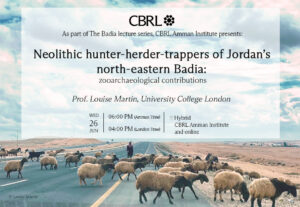Neolithic hunter-herder-trappers of Jordan’s north-eastern Badia: Zooarchaeological contributions by Prof. Louise Martin
Date: June 26, 2024
Time: 6:00 pm (Amman time), 4:00 pm (London time).
Format: Hybrid.

The CBRL Amman Institute is delighted to announce an exciting new lecture series titled ‘The Badia’, dedicated to exploring the rich cultural and environmental heritage of Jordan’s Eastern Desert. Scheduled throughout May and June 2024, this series offers a journey through four hybrid lectures presented by experts in the field.
The fourth and last lecture in this series will be presented by Prof. Louise Martin who is a Professor of Zooarchaeology at UCL’s Institute of Archaeology and was CBRL Residential Research Fellow 2023. Her research focuses on human-animal relations in the late Pleistocene & early Holocene of the Middle East and Anatolia, drawing on zooarchaeological approaches. She has led zooarchaeology teams for international projects in Jordan (Azraq Basin, Black Desert, Eastern Badia Project, Ghor es-Safi), Anatolia (Çatalhöyük, Boncuklu Höyük), southern Arabia and Iraqi Kurdistan.
Abstract
Throughout prehistory, Jordan’s north-east Badia provided rich hunting grounds for populations in both the Epipalaeolithic and Neolithic, with hunters clearly possessing a detailed knowledge of their prey. Drawing on zooarchaeological evidence, this talk tracks the PPNB introduction of sheep and goat herding to the north-east Badia, and the subsequent development of extensive pastoralism by the Early Late Neolithic. Alongside, we can examine the impact of ‘kite’ hunting on gazelle populations in the region. The latest zooarchaeological results from the Eastern Badia Archaeological Project (EBAP) sites at Wadi Qattafi and Wisad Pools contribute much to this picture. This talk explores how systems of herding and intensified hunting and trapping co-existed, and considers both the human and climatic impacts on wildlife and landscapes in the wider Azraq Basin.
To register, please click here.












